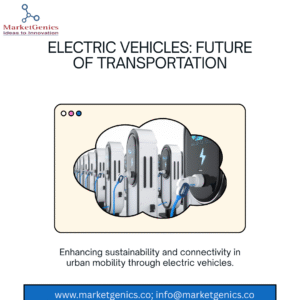The transport industry is changing ecologically and digitally as the global movement towards sustainable development picks up steam. Electric vehicles (EVs) are at the centre of this change, serving as essential nodes in intelligent and networked transportation ecosystems in addition to being environmentally friendly substitutes for internal combustion engines. When combined with smart grid systems, the Internet of Things (IoT), artificial intelligence (AI), and intelligent infrastructure, EVs are revolutionising how cities handle efficiency, energy, and mobility.

Electric vehicles are fast becoming an integral part of modern mobility systems. According to MarketGenics, the global EV market is projected to reach nearly around USD 1.5 trillion by 2030, with a CAGR of around 13.5%. However, beyond their rising adoption rates, EVs play a pivotal role in powering smart cities, systems built on real-time data exchange, interconnectivity, and sustainability.
Here are the key challenges faced by Electric Vehicle (EV) companies:
Challenge: EV manufacturing depends heavily on critical minerals like lithium, cobalt, nickel, and rare earth elements. Disruptions, price volatility, or geopolitical instability in supply countries can hinder production planning and increase costs.
How MarketGenics Can Help:
Challenge: Battery R&D is expensive and time-consuming. Manufacturers struggle to balance energy density, charging time, cost, weight, and thermal safety.
How MarketGenics Can Help:
Challenge: Scaling EV production requires huge capital investment in factories, automation, and specialized workforce. Maintaining unit cost while scaling is complex.
How MarketGenics Can Help:
Challenge: EV components (batteries, motors, inverters, etc.) lack universal standards, leading to compatibility issues and higher inventory complexity.
How MarketGenics Can Help:
Challenge: EV production increasingly uses connected machinery and digital twins, exposing manufacturers to ransomware, IP theft, and data breaches.
How MarketGenics Can Help:
Challenge: Choosing the wrong manufacturing site can lead to logistic inefficiencies, regulatory hurdles, or political instability.
How MarketGenics Can Help:
How MarketGenics Adds Value
Market research companies like MarketGenics offer data-driven guidance that enables EV manufacturers to:
EVs serve as smart nodes that communicate with other vehicles (V2V), infrastructure (V2I), the energy grid (V2G), and even pedestrians (V2P). This real-time data exchange enables:
V2X allows EVs to become proactive agents in smart cities, improving urban mobility efficiency and road safety.
Electric vehicles also serve a dual purpose in smart energy ecosystems. They can store energy and discharge it back into the grid when needed (V2G), balancing demand and supply:
According to MarketGenics, more than 27% of urban EV programs globally now incorporate smart grid integration as a core feature.
EVs constantly generate data on:
Smart city planners can use this data, collected anonymously to:
Fleet operators also benefit from predictive analytics, reducing downtime and improving efficiency through real-time fleet diagnostics.
EVs are accelerating the evolution of smart urban mobility through several innovations:
Connected EVs can communicate with smart parking grids to:
MarketGenics estimates that smart parking solutions linked with EVs reduce congestion by up to 30% in densely populated cities.
Smart cities are implementing EV-only lanes, monitored using AI to:
The Rise of Shared, Electric, and Autonomous Mobility (SEAM)
The intersection of electrification, connectivity, and shared mobility is driving a new business model: Electric Mobility as a Service (eMaaS).
MarketGenics notes that cities adopting shared EV systems reduce transport-related emissions by over 20% within five years.
As EVs become more connected, cybersecurity risks also grow. Potential vulnerabilities include:
Smart EV systems must include end-to-end encryption, secure firmware updates, and real-time intrusion detection to ensure safety and trust in the ecosystem.
Electric drivetrains are inherently better suited for autonomous systems, as their digital architecture is compatible with AI-powered navigation and control systems. According to MarketGenics:
This electro-digital convergence will define the future of smart transportation.
Electric vehicles are more than an answer to carbon emissions, they are the digital conduits of tomorrow’s transportation systems. As V2X communication, AI, and smart infrastructure evolve, EVs will become active players in shaping automated, sustainable, and interconnected cities.
MarketGenics provides in-depth market intelligence and technological foresight to help governments, urban developers, and EV manufacturers build a data-driven, future-ready mobility ecosystem. By aligning EV development with smart infrastructure planning, cities can transition to cleaner, smarter, and more inclusive transportation models.


MarketGenics India is a MRSI certified company.
Send us your resume at
info@marketgenics.co
© 2025 MarketGenics India Pvt Ltd.; All rights reserved